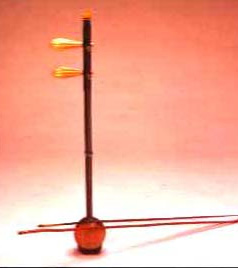 Banhu
Banhu
 The banhu is also called banghu and qinhu. With a history of more than 300 years, it was developed along with the appearance of the local opera, and led to the spawning of another musical instrument called the huqin. The banhu is loud and has a clear tone, but is graceful and soft at the same time. It is called banhu because it is made of pieces of wood flock, which are bonded together.
The banhu is also called banghu and qinhu. With a history of more than 300 years, it was developed along with the appearance of the local opera, and led to the spawning of another musical instrument called the huqin. The banhu is loud and has a clear tone, but is graceful and soft at the same time. It is called banhu because it is made of pieces of wood flock, which are bonded together.
At first, the banhu was popular mainly in northern China. It was frequently used as the major accompaniment instrument in many local operas and musical performances. Because the banhu is closely related to Chinese operas and dramas, it is especially good for those performances. The way the Banhu is used such performances varies from place to place.
The structure of a banhu is quite similar to that of an erhu, but there are still differences. The canister of the banhu is made of tung wood (a kind of wood from China), which is the key to producing the sound, while that of the erhu is made of animal skin. The tone of the banhu is especially clear and loud, and carries the flavor of the countryside. It plays the leading role among all the accompanying instruments in the band, and it produces the alto voice part in the chord.
Since the foundation of thePeople's Republic of Chinain 1949, musicians and instrument designers have made great efforts to improve their manufacturing skills. Many new types of banhu have been created. Among those new members are the mediant banhu, alt banhu, three-stringed banhu, bamboo banhu, and so on.
Along with improvements in manufacturing, performance skills have also been improved. The banhu has become an indispensable part of ethnic bands in China, and is also a solo-performing instrument with strong local flavor. It is often used to perform accompaniment for ethnic operas and singing and dancing as well as plain singing.
